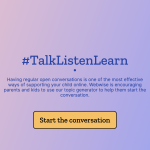Losing someone we love is a painful part of life. Helping our children deal with the tough feelings that come with it can be tricky. Grief is a natural response to loss in any form, not just a reaction to death. For children, grief can be felt over the death of a person or a pet, the loss of a friendship or relationship, parental separation, moving house or school, and so much more. Each child feels grief in their own way and it can change over time.
Children are naturally curious. Even before experiencing the death of a loved one, they think about death. While adults might find it hard to talk about death, children are often ready to share their thoughts. Creating a safe space for these talks allows children to express their understanding and emotions, and helps them to trust their parent. Remember, it’s okay if you don’t have all the answers. Just being there and listening is the most important thing.
There’s no right or wrong way to grieve. You might hear people talk about the ‘stages of grief’ or the ‘grief cycle.’ These are common feelings that people who are grieving might have, including feelings of shock, anger, sadness or gradual acceptance of living with the grief. Like adults, for children, the experience of grief is unique to each person. Children can go through periods of many different emotions and these can come and go over time.
Children can express grief in lots of different ways. This might depend on their age and understanding, their relationship with whom or what has been lost, the reactions of those around them, and their temperament or personality. Children might show an emotional response, such as feeling scared, worried, confused or sad. They might feel some physical things like being tired, having trouble sleeping or eating, and feeling pains for no reason. Sometimes, they might act differently, like having a hard time paying attention, not doing as well in school for a little while, forgetting things, or acting like they did when they were younger (like wetting the bed, wanting to sleep with their parent, or sucking their thumb). They might not want to be with friends or do things they used to enjoy. Be patient and allow them space to express their grief.
Tips for Parents To Support Their Grieving Child
- Communicate in a clear and age-appropriate way
It’s natural to want to protect our children from loss and upset, but a lack of clear communication can cause confusion. Using clear and age-appropriate language is important. Explaining simply what has happened and using clear language, such as ‘death’ or ‘dead’, helps prevent confusion and stops children from making up their own explanations or blaming themselves for the death.
- Emotional Support
Children will often seek increased connection with their parents when going through a difficult time. Remember, there’s no right way to grieve. Let your child know that it is okay to feel lots of different things and create a safe space for them to share these feelings with you. Listen to them and provide comfort.
- Prepare your child for events and changes
It’s important to prepare your child for any changes that will happen following a death. If children are going to be joining in rituals, such as funerals or celebrations of life, let them know what to expect and what will happen. Routines provide a sense of safety for children. Where possible, try to keep routines such as bedtime, mealtimes, and going to school. Support them to continue the activities they enjoy.
- Remember the loss
Keep the memory of your child’s loved one alive through activities like writing letters, looking at photos, drawing pictures, or sharing memories. These activities help express grief and maintain a connection with the person who is no longer there.
This article was contributed by the Primacy Care Child and Family Psychology Service, a member of Parenting Limerick.



